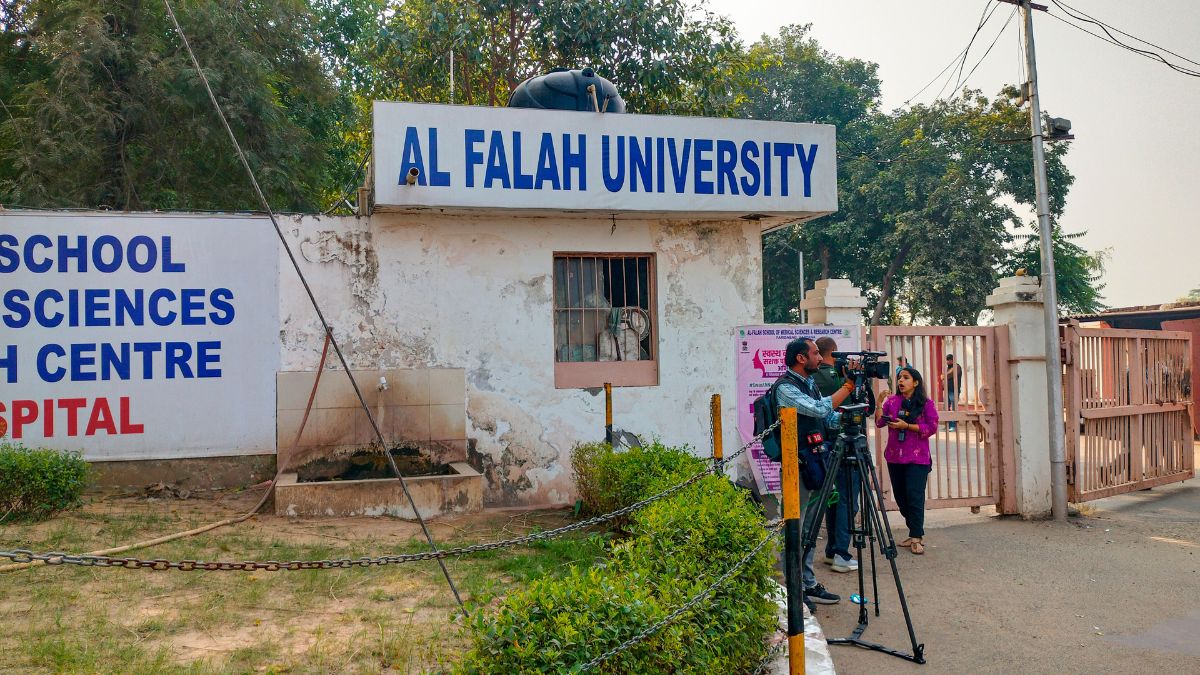The scrutiny on Al-Falah University in Haryana has increased after a blast near Delhi’s Red Fort on November 10 claimed 13 lives and injured many. The Haryana-based university came to the spotlight after three doctors working at the varsity were linked to the deadly explosion.
Now, the Enforcement Directorate (ED) has found widespread irregularities at Al Falah Charitable Trust and its affiliated institutions. The probe agency has accused the university in Faridabad of earning crores by making false accreditation and recognition claims.
Let’s take a closer look.
How Al Falah ‘defrauded’ students
The ED has arrested Al Falah group chairperson Jawad Ahmed Siddiqui in connection with its money laundering probe.
The agency has alleged that the varsity and Al Falah Charitable Trust generated “proceeds of crime” of Rs 415.10 crore by “dishonestly” inducing students and parents to pay through false accreditation and recognition claims.
Senior officials privy to the probe told CNN-News18 that the archived versions of the Al-Falah University show that the institution displayed National Assessment and Accreditation Council (NAAC) grades for its School of Engineering & Technology and its Teacher Education departments. This was done even though those accreditations had expired.
“The website was presenting expired NAAC certifications as valid," a source said, adding that this was not accidental or outdated, but “deliberate and sustained.”
There are also allegations that the university claimed eligibility under Section 12(B) of the University Grants Commission Act, which enables Indian universities to get central grants.
But investigators said that Al-Falah University had “never applied for such recognition," and thus could not claim it.
According to officials, these fake claims gave a big boost to the university’s credibility and statutory standing, which impact admissions.
Sources told CNN-News18 that students and parents were “induced to pay fees on the basis of these false claims," thinking they were getting admissions in recognised, accredited programmes.
The probe into the bank accounts and income tax returns (ITRs) of the institutions linked to the Al-Falah group showed that they were operating under a single Permanent Account Number (PAN).
ITRs were filed under the trust, enabling, as sources told CNN-News18, “a single financial channel that masked the actual revenues of individual institutions."
According to ED officials, this facilitated the unrestricted flow of funds between the university, colleges, and related entities, which muddled the distinction between legitimate academic income and allegedly tainted funds. “This is a classic method used in organised economic crime networks to merge illicit and lawful income streams," the agency said.
An analysis of Income Tax Returns from Financial Year (FY) 2014-15 to FY 2024-25 revealed that major sums were presented as voluntary contributions and educational receipts, reported ANI.
The amounts of Rs 30.89 crore in FY 2014-15 and Rs 29.48 crore in FY 2015-16 were filed under ITR as “voluntary contributions”. From FY 2016-17 onwards, the university reported substantial incomes as “receipts from main object” or “educational revenue”, including Rs 24.21 crore (FY 2018-19), Rs 41.97 crore (FY 2019-20), Rs 55.49 crore (FY 2020-21), Rs 55.15 crore (FY 2021-22), Rs 89.28 crore (FY 2022-23), Rs 68.87 crore (FY 2023-24) and Rs 80.10 crore (FY 2024-25).
The probe agency said the total income generated in the years when the varsity lacked valid accreditation amounted to Rs 415.10 crore.
The ED claimed this represents “proceeds of crime" as it was procured through deception, cheating, and forgery. “The entire revenue inflow from students rests on misrepresentation," a source said to CNN-News18.
The ED took cognisance of two FIRs filed by the Delhi Police to lodge its case under the Prevention of Money Laundering Act (PMLA) against the Al-Falah group.
Al-Falah university founder sent to police custody
Al-Falah University’s Chancellor and founder, Jawad Ahmad Siddiqui , was sent to a 13-day ED custody till December 1 by a court in Delhi on Wednesday (November 19). He was arrested by the federal probe agency on Tuesday night after it carried out searches against the Al-Falah University group.
The ED, which had sought his 14-day remand, told the court that Siddiqui’s arrest was necessary as he had “incentives” to flee India as his close family members are in the Gulf, PTI reported.
“Accused has significant financial resources and influence and has a history of serious economic offences. His close family members are also settled in Gulf countries and he has incentives to flee India.
“Given the gravity of the present allegations (with proceeds of crime quantified in hundreds of crores) and the potential consequences under PMLA, there is a reasonable apprehension that if not arrested he may abscond or remain unavailable for effective interrogation, relocate assets and himself beyond the jurisdiction, and continue to delay or obstruct the investigation,” the ED told the court.
According to the ED, Siddiqui, the managing trustee, was “controlling the mind” of Al Falah Charitable Trust and had de facto influence over Al Falah University and its institutions.
It argued that Siddiqui’s custodial interrogation was needed to unearth the complete extent of the “proceeds of crime”, including those not disclosed in the ITR figures.
The ED further claimed that the Al-Falah university founder has “command” over the staff in charge of admission registers, fee ledgers, accounts and IT systems of the varsity and other institutions under the Trust, adding that he could “destroy or alter records”.
The agency, citing the two FIRs of the Delhi Police against Al-Falah group, said there were “reasonable grounds” to believe Siddiqui committed money laundering under Section 3 of the PMLA by taking part in activities linked to “proceeds of crime” generated through cheating, forgery and misrepresentation of NAAC and UGC recognition.
The agency pointed out that the Al-Falah group has seen a “meteoric rise” since the 1990s, emerging as a large educational body.
“However, the financials of the various entities are at variance with the huge amount of assets/wealth accumulated by the group,” the ED told the court.
Siddiqui’s lawyer argued that his client was falsely implicated in the case.
With inputs from agencies
)